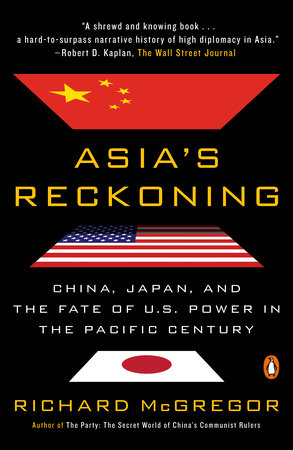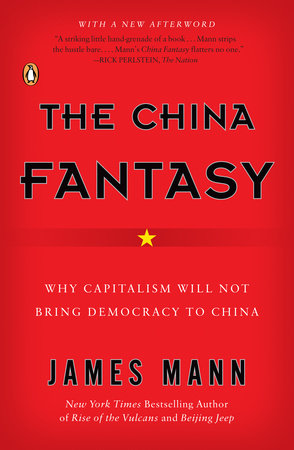

Asia's Reckoning
By Richard McGregor
By Richard McGregor
By Richard McGregor
By Richard McGregor
By Richard McGregor
Read by Steve West
By Richard McGregor
Read by Steve West
Category: World Politics | Asian World History
Category: World Politics | Asian World History
Category: World Politics | Asian World History | Audiobooks

-
$18.00
Dec 04, 2018 | ISBN 9780399562693
-
Sep 05, 2017 | ISBN 9780399562686
-
Sep 05, 2017 | ISBN 9780525500018
975 Minutes
Buy the Audiobook Download:
YOU MAY ALSO LIKE
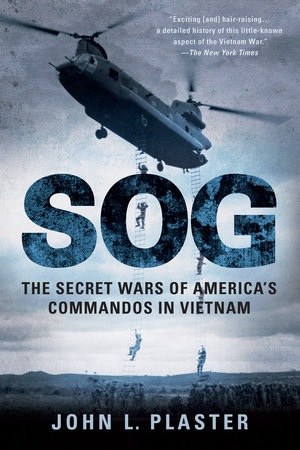
Sog
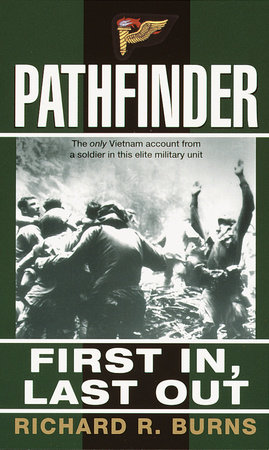
Pathfinder
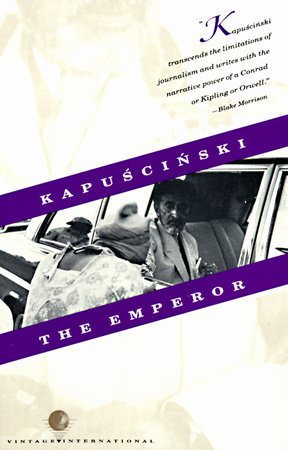
The Emperor
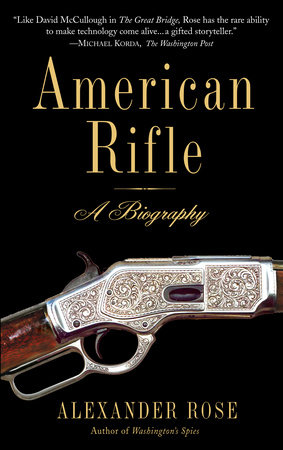
American Rifle

Unforgivable Blackness
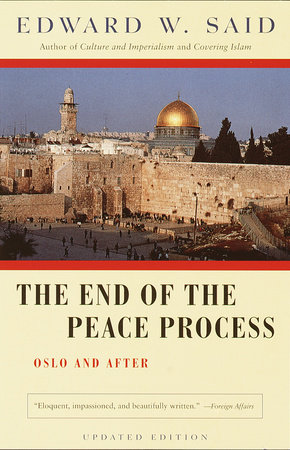
The End of the Peace Process

Acid Test

Bessie Smith

If You Survive
Praise
“McGregor is perfectly placed to analyze the crucial three-sided relationship that defines the balance of power in the Pacific.”
—Gideon Rachman, Financial Times (Best Books of 2017)
“McGregor has written a shrewd and knowing book about the relationship between China, Japan and America over the past half-century. Among much else, he shows how the world’s top three economies are now imprisoned by increasingly unstable dynamics, and not only in the military realm. Though Mr. McGregor has pored over archives to put together a hard-to-surpass narrative history of high diplomacy in Asia, the strength of his book is its old-fashioned journalism, in which empathy and explanation outweigh mere exposé. Indeed, Asia’s Reckoning has the aura of a ‘tour-ender,’ the kind of conspectus that foreign correspondents of a generation ago and further back would put together after they had finished a multiyear stint in some far-flung place. Here are insightful, detail-rich profiles of everyone from Zhou Enlai and Henry Kissinger to Kakuei Tanaka and Jiang Zemin.”
—Robert D. Kaplan, The Wall Street Journal
“A well-documented account of the post-war triangular relations between China, Japan and America. . . . McGregor [has] access to a range of archives and memoirs beyond the reach and nuanced comprehension of most other scholars. His narrative of relations and contacts between the leading politicians and policy-makers in both [China and Japan], and of America’s interplay with the two, makes for a compelling and impressive read. One notable feature is how often the Americans, from Henry Kissinger to Barack Obama, seem to find their close Japanese allies more irritating and harder to understand than their Chinese counterparts, even as a rising China is coming to be seen as America’s greatest 21st-century challenger.”
—The Economist
“Sometimes a crisis hits that reminds us of the need to think in terms of the interplay between multiple centers of power, and of the value of books that do not confine themselves to bilateral relations. The current furor over North Korea is one such crisis, and Richard McGregor’s skillfully crafted and well-argued Asia’s Reckoning is a good example of the sort of book I have in mind. . . . The great strength of Asia’s Reckoning, indeed, is that it encourages the reader to look for continuities amid apparent dramatic change, as well as subtle changes amid apparent continuity. McGregor helps us appreciate the areas where leaders of the US, Japan and China find it easiest and hardest to find common ground. He also sensitizes us to the complex ways in which the ratcheting up or loosening of tensions between Washington and Tokyo or Beijing inevitably affects the strategies of leaders based in the other east Asian capital. . . . An engaging, timely book that provides a nice complement to important recent studies focusing on two points of the US-China-Japan triangle.”
—Jeffrey Wasserstrom, Financial Times
“Tackles how the interplay of Chinese assertiveness with Trump’s dissolution of US power is fundamentally altering the balance of power in this vast region. . . . McGregor’s brilliant book is packed with insights, especially on the complex Sino-Japanese relationship, the gist of that being that past history should be our teacher rather than master. Will a more powerful China learn magnanimity, one wonders.”
—Michael Burleigh, Evening Standard (Best Books of 2017 Selection)
“[McGregor] has a sharp eye for personalities and policy factions, as well as a firm grasp of geopolitics. His fascinating narrative of the three countries’ relations over 50 years is filled with fresh anecdotes drawn from interviews and newly released archival documents. . . . Flinty realism has usually driven trilateral diplomacy, but in McGregor’s view, no factor has done more to sustain the shape of the triangle than Japan’s inability to allay Chinese resentment over the depredations of the 1930s and 1940s.”
—Andrew J. Nathan, Foreign Affairs
“Undoubtedly the best book I have read all year. . . . The main strength of McGregor’s account is that it shows how important history has become to relations in the region. . . . One of the themes of McGregor’s book is that Americans think China is much easier to read than Japan, where they find the corruptly byzantine politics and culture of indirection frustrating. . . . Whether, psychologically, the USA can cope with its relative decline and whether China can move to a more magnanimous understanding of its role are the questions on which peace and war in the region hinge.”
—Michael Burleigh, Literary Review
“McGregor warns against underestimating the historic tensions between China and Japan. Trade and tourism may run smoothly between the two pragmatic, business-minded nations, but deep, mutual dislike simmers under the surface. McGregor says it would not take much of a trigger to disrupt the region’s tentative peace. . . . An excellent modern history book that explains the roots of the complex political, business and military ties between major superpowers. In an age of rocky global politics, Asia’s Reckoning provides the context needed to make sense of the region’s present and future.”
—Joyce Lau, South China Morning Post
“McGregor deploys interviews with heavy hitters from all three countries and cites extensive archival research to provide readers with a comprehensive look at this often misunderstood trilateral relationship. Whether it’s Chinese Communist Party founder Mao Zedong thanking Tokyo for its invasion of his country, or Japan’s fears of being replaced by China as America’s top partner in Asia, or Henry Kissinger’s intense distaste for Tokyo’s droll diplomats, McGregor mixes in one little-known anecdote after another to pull readers through his narrative. . . . Balanced and insightful, the book goes the extra mile to delve into the minutiae of the relationships, taking readers beyond mere Japanese peculiarities, Chinese propaganda and American stereotypes. . . . This is an astute take on the three nations’ modern ties, serving up a much-needed and often overlooked helping of the context necessary for making sense of Asia complexities.”
—Jesse Johnson, Japan Times
“In Asia’s Reckoning McGregor provides a cogent and superbly researched guide to the deep forces that undergird China’s geo-political strategy and the attempts of two other great powers in the region, the United States and Japan, to deal with it.”
—Peter Tasker, The Mekong Review
“McGregor, an absorbing storyteller, [takes] the reader behind the curtains to witness how the history of China’s ties with Japan and the US unfolded after World War II. . . . [His] precise observations and incisive analyses of the dynamics in the China-Japan-United States relationship are valuable.”
—Cheong Suk-Wai, The Straits Times
“A must read for anyone who wants to understand our future. Asia’s Reckoning provides a detailed picture of the slow military, diplomatic and economic waltz between China, Japan and the United States that determined the shape of the past half-century. . . . The framework that previously determined the contours of our international engagement is changing. McGregor [is] dealing with a subject that’s crucial—China’s place in the world—but does so in an intimate manner, bulging with insightful interviews with the players behind the scenes.”
—Nicholas Stuart, Brisbane Times
“A compelling account of the post-war relationship between China, Japan and America [that] brings to life one of the world’s most complicated love-hate triangles.”
—Clifford Coonan, The Irish Times
“McGregor shows that U.S. diplomats and military strategists have deftly played the Sino-Japanese rivalry in the Pax Americana period since the end of the Cold War. However, he is concerned that the tightrope is becoming frayed and that if it breaks, all three performers could be in for a terrible fall. . . . [Asia’s Reckoning] has anecdotes and insights that will delight policy wonks interested in the region.”
—Gary Anderson, The Washington Times
“For journalists taking up new posts in China, the first book I always suggest is Richard McGregor’s The Party. I will now add McGregor’s new book, Asia’s Reckoning, to my list for those headed to the Far East.”
—Melissa Chan, Los Angeles Review of Books
“In spite of the recent crisis with North Korea, the critical relationship for Asian peace and stability in the 21st century will be the trilateral balance between China, Japan, and the United States. In spite of the economic interdependence of these nations, their domestic politics and foreign policies often clash with their trade interests, and the rise of China as both an economic and military power now threatens to upend the entire East Asia security structure. . . . This book is an essential primer for anyone seeking to understand the complicated brew of history, politics, and prejudices that make this area of the globe one of the most likely flashpoints of the 21st century.”
—Jeremy Lenaburg, New York Journal of Books
“McGregor anatomizes the dynamic, often strained trilateral relationship between China, Japan, and the U.S. since WWII. His informed volume comes at a time when, in his opinion, East Asia sits at the heart of the global economy and China’s aggressive foreign policy is upsetting the region’s stability. . . . Often critical of Washington’s ‘combination of idealism and arrogance,’ McGregor offers detailed, vivid descriptions of America’s Asian diplomacy. . . . Reviewing East Asia’s toxic rivalries with balance and insight, McGregor’s survey concludes ominously with President Trump’s lack of familiarity with regional issues and disdain for old alliances, portending further tensions in East Asia’s future.”
—Publishers Weekly
“[A] wide-ranging study of China’s re-emergence as a regional power in Asia after a long hiatus, thwarting the designs of other powers, including the United States and Russia. . . . The U.S. [finds itself] firmly ensnared in the so-called Thucydides trap, ‘the principle that it is dangerous to build an empire but even more dangerous to let it go.’ So it is, and the current leadership appears to be at a loss about what to do or to formulate other aspects of any coherent policy in and toward Asia. . . . Geopolitics wonks will want to give attention to this urgent but nonsensationalized argument.”
—Kirkus Reviews
“The United States, China, and Japan form the power triangle that will shape much of the international politics in the 21st century. Richard McGregor’s masterful The Party illuminated one corner of that triangle—China. In this important book he describes how the other two corners have interacted with China since World War II. Lucid, insightful and ominous, as the author describes big trouble ahead.”
—Eliot Cohen, author of Supreme Command
“Richard McGregor’s new book is essential reading for anyone worried about the most fraught relationship in Asia—between China and Japan. With extensive experience in and knowledge of both China, Japan, and the United States, McGregor is in a unique position to unpack the relationship and sort through the extensive propaganda and myth-making on all sides. A great read!”
—John Pomfret, author of The Beautiful Country and the Middle Kingdom
“McGregor distills years of meetings with high officials in China and Japan to give a vivid nuanced picture of their relations in the 21st century.”
—Ezra Vogel, author of Deng Xiaoping and the Transformation of China
“An in-depth depiction of radical changes and challenges in Japan-China relations in the post-war period, thoroughly researched and rich in storytelling. In the course of tumultuous relations with China, Japan has had to trail blaze in the face of the rise of China. Japan’s naked exposure to the unfolding Realpolitik with China at its core is for the first time comprehensively reviewed.”
—Yoichi Funabashi, former Editor-in-Chief, Asahi Shimbun
21 Books You’ve Been Meaning to Read
Just for joining you’ll get personalized recommendations on your dashboard daily and features only for members.
Find Out More Join Now Sign In






